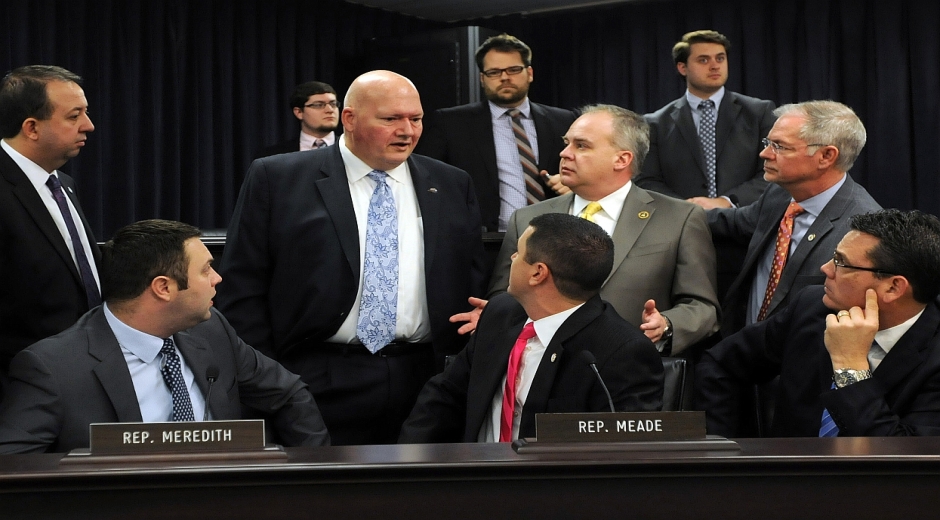
Week Four At The General Assembly

Thomas McAdam
iLocalNews Louisville is your best source of news and information about Derby City.
- Professional Journalist
“Getting our financial house in order” was the theme Gov. Matt Bevin returned to several times as he gave his first budget address last Tuesday night during a joint session of the Kentucky General Assembly.
The governor’s State of the Commonwealth Budget Address unveiled a two-year spending plan that calls for 9 percent cuts across state government with the much of the savings aimed at helping state pension systems meet obligations.
In addition to the proposed 9 percent cuts over the next two fiscal years, the governor also announced 4.5 percent budget cuts for the final half of the current fiscal year.
Not all parts of state government would be hit by cuts under the governor’s spending plan. The main school funding formula, known as SEEK, is spared. So is Medicaid, Veterans Affairs, school district health insurance, student financial aid and more.
While budget cuts would be widespread, the governor’s spending plan calls for increased spending for some front-line public servants including the Kentucky State Police and other peace officers, social workers, public defenders, correctional officers and others.
Now that the governor has delivered his spending plan, it’s time for lawmakers to take the proposal apart and reassemble it in a manner they are satisfied with. The state budget bill is currently in the House, where budget subcommittees will dig into all parts of the budget in the weeks to come. Once the House approves a spending plan, it will be the Senate’s turn. By session’s end, Senate and House members are expected to meet in conference committee meetings to iron out differences in each chamber’s preferred spending plans. With the 2016 session scheduled to adjourn on April 12, there’s much work to do in the time available.
As lawmakers focused on budget issues this week, they also continued moving a number of bills through the legislative process, including legislation on the following topics:
Informed Consent. A consultation between a woman seeking an abortion and a health care provider would have to occur during an in-person meeting or through real-time video conferencing under the version of Senate Bill 4 approved by the House this week. The version of the bill approved by the Senate last week called for in-person consultations but did not provide the videoconferencing option. Information is already legally required to be provided to women seeking abortions 24 hours before the procedure, but currently the info is sometimes delivered over the phone rather than in person. Senate Bill 4 has returned to the Senate for consideration of the House changes to the legislation.
CPR. A bill that would require public high school students to learn CPR passed the state Senate this week. Senate Bill 33 as amended would require CPR be taught in physical education, health or junior ROTC classes in either ninth, 10th, 11th or 12th grade. The bill has been sent to the House for consideration.
Minimum wage. The state’s minimum hourly wage would be raised to $10.10 over the next two and half years under a bill that cleared a House committee this week and is now awaiting consideration by the full House. House Bill 278 would increase Kentucky’s current minimum wage of $7.25 an hour to $8.20 this August, $9.15 in July 2017 and $10.10 in July 2018. The increase would not apply to businesses that have a recent average annual gross volume of sales of less than $500,000.
Concealed carry. Senate Joint Resolution 36 urges Virginia, which borders Eastern Kentucky, to restore a so-called reciprocal agreement that allowed Kentucky concealed carry permit holders to legally carry a concealed firearm in Virginia. The legislation was approved in the Senate this week and has been sent to the House for consideration.
Infant protection. Parents of newborns would have up to 30 days to surrender their baby at a state-approved safe place without facing criminal charges under legislation approved by the House this week. Current law gives parents 72 hours after a child is born to leave the baby at a hospital, police or fire station or with emergency medical services personnel if they feel unable to care for the child. House Bill 97 would expand that to 30 days and add churches or other places of worship to the list of approved safe places where a child could be surrendered. Parents would not face charges for surrendering the baby as long as the child is not injured. The bill has been sent to the Senate for consideration.
(Robert Weber, of the Kentucky Legislative Research Commission contributed to this article)

Gideon John Tucker (February 10, 1826 – July 1899) was an American lawyer, newspaper editor and politician. In 1866, as Surrogate of New York, he wrote in a decision of a will case (Final Accounting in the Estate of A.B., 1 Tucker 248, N.Y. Surr. 1866): "No man's life, liberty or property are safe while the Legislature is in session."